
October-December 2015
Editorial

The Sangjog has been disseminating news and information on education, health and social development programs undertaken by BCCP. As a result, the target audience gets a complete idea on the development programs including public health. They then become interested to practice and accept social development and new healthy behaviors based on their own environment, social norms and values, and viewpoints. BCCP has put emphasis on ICT to keep up with the challenges of the 21st century and thus make its programs more dynamic. This means that the use of ICT is gradually spreading in the planning and implementation of the public health and social development programs.
In this regard, ICT is being considered in education, health and social development sectors under BKMI-II, PPRP-II (2nd Revised), CRPARP and SLD Workshop through BCC e-Toolkit, online and offline e-Learning courses, digital archive, website of BCC Working Group, online photo album, mobile apps, desktop application, online sharing media, website of CRPARP, online database and web application. Moreover, BCCP has its own facebook page which is regularly updated. Besides social media is also used in many of its programs.
We hope that the Sangjog bridges the people of the 21st century with the strategic communication process. Therefore in an age of ICT we expect the Sangjog to serve as an important repository of BCC related information.
Best wishes
On Introduction of e-GP I returned to this Profession
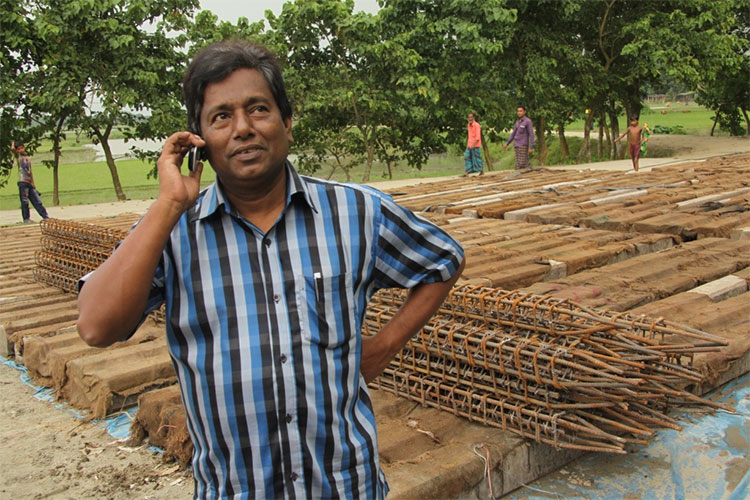
“Since 2013-14, I have been regularly receiving awards or contracts. Now I can work from home entirely risk free. Compared to before, trust between the procuring entities and contractors trust has grown because of e-GP. The many loopholes through which corruption could seep in have been closed. The use of musclemen, grouping, various kinds of tendering are not possible anymore. My identity now is that of a successful contractor which has only been possible due to e-GP.”
Ashraful Alam, a renowned contractor in the Sherpur district, delivered above statement. He has been involved in this profession the last 30 years. At present he is working closely as a contractor of LGED. But at one point in time he left this profession. When musclemen and mastaans in the name of tendering destroyed the business, he left this profession and chose to become involved in the rice business. Gradually he created an organization for the rice businessmen. Among these businessmen some were even involved in the contract business. When e-GP was introduced they were the ones who informed him that there is no scope for malpractice. Then again he began to submit tenders this time through e-GP.
Mr. Ashraful Alam said, “At present I have nearly 40 crore taka worth of work in my hand. I believe that e-GP will announce Bangladesh’s unity with the dynamic world.”
It is mentioned that BCCP are collecting real success stories relating to e-GP from the relevant individuals and organizations for raising success to mass people under PPRP II (2nd revised) project. So the story of Mr. Ashraful Alam, contractor of Sherpur district, is displayed and admired in the third South Asia Regional Public Procurement Conference 2015 which is recently held in Dhaka. In inaugural session of this event, Mr. A H M Mustafa Kamal, Honorable Minister, Ministry of Planning, was present as chief guest and Mr. Md. Shahid Ullah Khandaker, Secretary, the Implementation, Monitoring and Evaluation Division (IMED) of Ministry of Planning, made his speech as closing remarks.
Children Music Competition under CACPV project
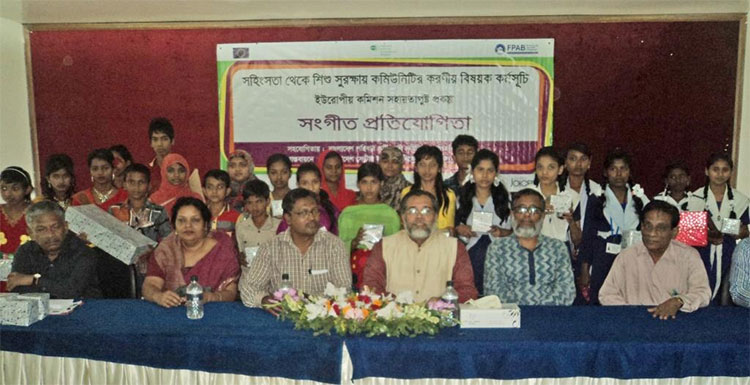
BCCP organized a Children Music Competition among the disadvantaged children at CSS AVA center in Khulna on 18th November 2015. Mr. Gokul Krishno Ghosh, Joint Secretary, Government of Bangladesh and Chief Executive Officer, Khulna City Corporation inaugurated the Music Competition as the Chief Guest. As special guests, local elites including Mr Swapan Kumar Guha, Founder and Executive Director, Rupantar; Ms. Nargis Fatima Zamin, District Women Affairs Officers; Mr. Abul Alam, District Children Affairs Officer, Bangladesh Shishu Academy; Rozina Akther, Asst. Public Prosecutor, Judge Court, Khulna; Ms. Nasrin Akther, Deputy Program Officer, UCEF Bangladesh were present in this occasion. The objective of the children music competition is to strengthen community actions for child protection by using of multi-formatted communication media tools.
In his speech, the chief guest said, “this initiative of BCCP will build confidence among the children and raise awareness about the importance of protecting children from violence.” Others guests discussed on the status of child protection in Bangladesh. End of the music competition, most of the children are shared their feelings “We did not get any opportunity to participate in such type of competition before. Today we are very happy to participate in this competition.”
Children Music Competition has been conducted for Patriot song, Modern song, Folk song and Local song. Prizes were given among the winners. A total of 59 disadvantaged children of Bangladesh Shishu Academy, Directorate of Women Affairs, Directorate of Social Service, UCEP Bangladesh, JJS, FPAB, Aparajeyo Bangladesh were participated in this music competition. Renowned and experienced music directors and producers of Khulna Betar were members of Judges Panel in the music competition.
Workshop on use of ICT in SBCC held
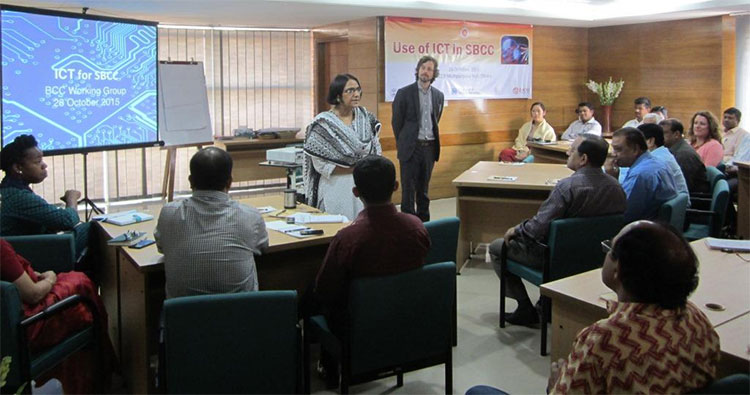
A workshop on use of ICT in SBCC was held on 28 October 2015 at BCCP’s Multipurpose Hall in Mirpur. The workshop was facilitated by Mr. James BonTempo, Director ICT & Innovation, Johns Hopkins Center for Communication Programs.
The workshop created great opportunity for BCC Working Group Members to learn and exchange thoughts with Mr BonTempo who is an Information and Communication Technology (ICT) expert with 20 years of working experience. Mr BonTempo provided technical leadership to international organizations as well as global and country-level projects in countries across Africa and Asia. The areas include education and training, knowledge management, behavior change communication, health service delivery and monitoring & evaluation.
The interactive sessions of the workshop focused on different issues of ICT in relation to SBCC which created a lot of interest among the participants. The sessions also covered identifying appropriate application of ICT, resource planning and how to make the interventions sustainable. Mr Tempo explained how to break down problems into components to understand it properly.
In that event some digital solutions developed by BKMI project was shared as the examples of using ICT tools for SBCC, these are HPN BCC eToolkit for Field Workers, eLearning courses for Program Managers and Planners, SBCC Program Managers and Planners eToolkit and Digital Achieve of three units (BHE, IPHN and IEM).
Around 55 participants from government, NGO, INGO, donor agencies, academics and media attended the event. The workshop was graced by Dr Md Quamrul Islam, Line Director, IPHN as a Guest of Honor. The workshop was organized by Bangladesh Behavior Change Communication (BCC) Working Group with support from BKMI project.
A Study Findings Sharing Workshop on Tobacco Control Held
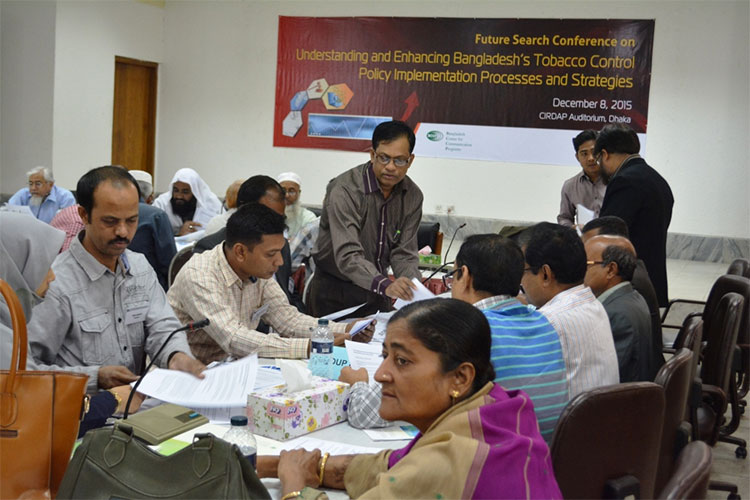
A validation Workshop was organized on December 8, 2015 in Dhaka to share findings from a study on tobacco control titled: ‘Understanding and Enhancing Bangladesh’s Tobacco Control Policy Implementation Processes and Strategies’. Representatives from the concerned Ministries of the Government of Bangladesh, including key stakeholders both from the government and non-government sectors who are responsible for implementing Tobacco Control policies in Bangladesh, attended the workshop. The objective of the workshop was to share the study findings with all the participants and stakeholders and involve them to take part on discussions to understand the depth of the study findings and identify aspects that could have been missed during data collection and learn new insights about processes and strategies that can be used to further improve implementation.
Mr. Azam-E-Sadat, Deputy Secretary and Program Manager (Tobacco Control Program), Ministry of Health and Family Welfare was present in the workshop as the Chief Guest. In his closing remarks, he appreciated BCCP and the Institute for Global Tobacco Control (IGTC) for conducting the study and for sharing the findings by organizing the workshop. He commented that the findings of the study are valuable as these will help the concerned stakeholders in adopting appropriate strategies for optimal implementation of tobacco control policies in Bangladesh.
It may be noted that BCCP, in collaboration with (IGTC) based at the Johns Hopkins Bloomberg School of Public Health, USA conducted the study. The key objective of the study is to enhance tobacco control policy implementation, in part by developing an understanding of tobacco control policy implementation processes and strategies in Bangladesh. Under this study, 70 Key Informant Interviews (KII) were conducted throughout the country with major stakeholders to understand different aspects of tobacco control policy development and implementation, and know how the concerned organizations are implementing the subset of policies under the Smoking and Tobacco Products Usage (Control) (Amendment) Act, 2013. Data were also collected on what the concerned organizations did before and after the laws came into effect and their opinions on what went well and what can be learnt from the process.
The preliminary research findings are now available which seem very interesting and look worth for the advancement of tobacco control law implementation in Bangladesh.
eLearning Course – A new solution to enhance knowledge and skills of SBCC Professionals
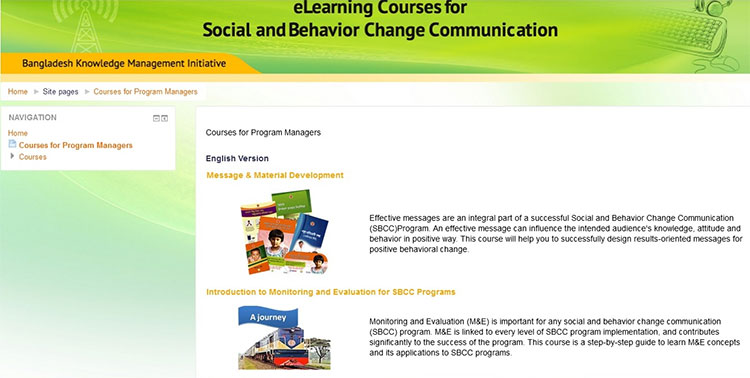
eLearning courses, developed by BKMI, on Message and Material Development (MMD) and Monitoring and Evaluation (M&E) for Social and Behavior Change Communication (SBCC) are now available online. These courses are meant for the people who are involved in planning, designing or implementing (SBCC) programs. Anybody, from any part of the world, can take these free courses at their own pace by logging into http://bdsbcc.org/
The six-module MMD course provides hands-on knowledge on designing results- oriented messages and materials for positive behavior change through videos, illustrations, and interesting examples.
The M & E course has four modules, which provide basic concepts of SBCC M & E and their application in an entertaining way. These courses are first of its kind not only in Bangladesh but also in the region. The learners will also get a certificate after completing the courses. The Bangla version of these courses will be available soon.
BKMI is a three-year USAID-funded project under the global Health Communication Capacity Collaborative (HC3), implemented in collaboration with Bangladesh Center for Communication Programs.
Social Engagement and Messaging Workshop
Public Procurement Reform is vital to improve the governance and public service delivery in terms of Public procurement System. To communicate the benefits of the reform especially e-GP; a two days workshop named as Social Engagement and Messaging Workshop was held on 20-21 November 2015 at Srimongal, Sylhet. The Central Procurement Technical Unit (CPTU) of Implementation, Monitoring and Evaluation Division under Ministry of Planning organized the workshop with technical assistance of the World Bank. Bangladesh Center for Communication Programs (BCCP) facilitated the workshop.
A total of 30 participants were present from Government procuring entities, tenderers, civil Society, media professionals, and officials of CPTU in this workshop. The World Bank and BCCP attended the workshop. Director General of CPTU Md. Faruque Hossain inaugurated the workshop, while Mr. Zafrul Islam, Lead Procurement Specialist of the World Bank spoke at the inaugural session as special guest. Ms. Yasmin Khan, Team Leader and Ms. Khadija Bilkis, Deputy Team Leader of Social Awareness Campaign and Communication Component under the Public Procurement Reform Project-II facilitated various sessions of the workshop. The overall objective of the workshop was to find out various ways to create awareness among the intended audience of this program and to motivate them using e-GP to participate in public procurement process. The participants also get involved in various brainstorming sessions to develop effective messages communicating the benefits of e-GP and to identify the most efficient ways to disseminate those messages.
The participants discussed that it is very much important to make the stakeholders specially tenderers to understand that e-GP ensures transparency, accountability, equal treatment, fair competition, timeliness and best utilization of public funds. They also discussed that it is possible to implement Electronic Government Procurement (PPR) through changing the perceptions of all concerned by using strategic communication and social engagement. Considering the new generation and government policy, use of Social Media and ICT based interventions were also got equal importance in the discussion of the workshop.
The speakers of the workshop opined that e-GP can be one of the main driving forces for the increase of overall GDP growth. e-GP ensures improvement in public procurement and has opened a new opportunity for overall development of the country. The workshop was closed with the expectation that the reform especially e-GP will be popular and people will use this system to participate in any kind of Government procurement.
Workshop on Advances in Strategic Communication under the BCCM Component of UPHCSDP Held
The Workshop on Advances in Strategic Communication under the BCCM Component of the Urban Primary Health Care Services Delivery Project (UPHCSDP) was held during October 25-27, 2015 at Rajendrapur, Gazipur. A total number of 29 participants from PMU, PIU and PA-NGOs from all over Bangladesh attended to the workshop. The categories of the officials who participated include Project Managers and Clinic Managers from PA units, Senior Program Officer and Program Officer from Project Management Unit (PMU), and Program Manager and Program Officer from Project Implementation Unit (PIU).
The workshop on Advances in Strategic Communication was a 3-day long residential workshop where participants got close to each other to share and disseminate their views and ideas on topics like Importance of Strategic Communication, Strategic Leadership, Advocacy, Management of Change, Campaign, Brand Positioning etc. The Project Director, UPHCSDP made presentations on Sustainable Development Goals and on Increasing Capacity of the Organization. The guests in the opening and closing sessions emphasized on sharpening ideas and perceptions of strategic communication and their application in implementing BCCM interventions of the project. A number of recommendations were made in the workshop based on the presentations made. The participants did an exercise in groups analysing their current situation and what they can do in future to improve capacity of services of the project which they presented in the workshop.
Mr. Md. Abu Bakr Siddique, Project Director, PMU, UPHCSDP was present in the Inaugural Session of the workshop as the chief guest. In the closing session of the workshop, Mr. Dhiraj Kumar Nath, Staff Consultants (Urban Health), Bangladesh Resident Mission, Asian Development Bank was present as the chief guest. The workshop was mainly facilitated by the Team Leader of BCCM component, Ms. Yasmin Khan as the Course Coordinator.